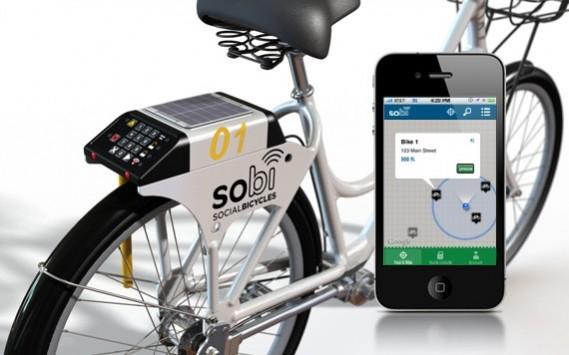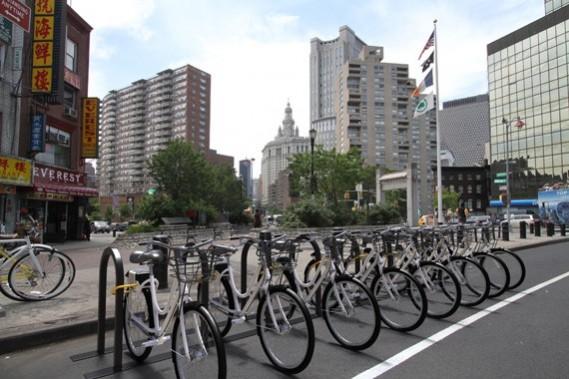The world is now in finger your tips. Thanks to the dynamic and constantly developing mobile phone technology and vivid applications, which are making our day to day tasks easier. Now, the latest invention: Bike sharing using your Android and iOS apps! Isn't it cool?
Social Bicycle or SoBi is an organization working towards building a smart- infrastructure that will enable the subscribers to rent, use and share smart bikes in smarter ways with their compatriots in and around the city.
SoBi's bicycles are engineered with an on-board computer, mobile communications and an integrated GPS-enabled lock and "this disruptive product and the supporting mobile and web applications will create a flexible, scalable, and affordable bike sharing system," say the SoBi developers.The smart bike sharing system likely be available by end of the summer.

Ryan Rzepecki, founder of SoBi, was interest in promoting the bicycle amongst the urban people, and this love for bikes led him to low-cost smart bike sharing project, which is more affordable than picking up a bike from docking stations.
"The cost of European-style smart-rak programs at $5,000 per bike, while SoBi provides 50 bikes at $1,100 each. But it isn't just the cost savings and flexibility that make SoBi a better option," Yahoo quoted Rzepecki as saying. According to sources, the wireless data runs $15 per bike, per month.
Rzepecki argues that besides the smart way of sharing and renting the bikes at low-cost, "the city planning by training will also get treasure trove of data, thanks to the smart bikes."
The drill is simple; the subscriber of SoBi can track down a bike standard closest to his/her place through mobile application and reserve it. Once the person nears the smart bike, the subscriber can unlock it by entering the conformation pin code that they received on app, while reserving the bike, directly into the keypad on the lockbox, built behind the bicycle. And there it's the bike is ready for the ride.
The GPS system in-built in the bike will track the routes and enables the other user to identify the place and where the bike is available, once the prior-subscriber was done with the ride.

According to the SoBi, the redistribution of the bikes process will mostly be managed by the users themselves through a dynamic incentive system.
"Operators can select the system zone and hub locations and set these boundaries in our database. When a user locks the bike outside of a hub location, they are charged a fee. This fee is posted to the map and the next person to take the bike and return it to a hub receives a credit," said the SoBi.
"This ensures, meanwhile, that bikes are consistently returned to hubs, and allows the flexibility to bike directly to any destination within the system area. However, if someone locks up outside the system zone, they would be charged a larger recovery fee for taking the bike too far from the system core," it added.
Although the Bicycle Sharing system is an old concept, it came into existence lately in 2007, initially across Europe. The urban cities have huge docking stations for bicycles, where the people can rent a bike and use to cover a short trip. This was mostly engaged by local community groups or non-profit organisations and most of the time the ride would be free or at-least affordable.
The government also run this programme with a nominal rent fees and sometimes in public-private format.
The prime motivation of this system is to promote the usage of cycle to reach the shorter distance instead of taking motor vehicles, thus reduce traffic problems to a significant level and scale down the noise and air pollution.
The bicycle sharing system, however, is still in its infancy as far as India is concerned. The community folks and the eco-minded university students have kicked off a pilot programme on this bike sharing system in cities like Mumbai and Bangalore, advising the people to rent the cycles to counter the last-mile problem, instead of opting for autorickshaws or taking their cars out for a short trip.
The two university students in Mumbai last year had launched 'Cycle Chalo' programme- means 'ride a cycle'- renting the cycles for students against their college ID cards to reach their college riding a bike, charging Rs 3, per ride. They started this programme with 30 cycles docked at Mulund railway station, aiming to promote the environment sensibility among the college goers.
In Bangalore, meanwhile, automated public bicycle sharing system (ATCAG) was also kicked off same year, with 9 bikes stationed at three locations in the city, planning to expand the programme in setting up a station every 500 meters.
However, the project supposedly suffered lack of support and attention from public, though few of the sensible communities are trying hard to enlighten the urban inmates about the significance of turning bicycles as a primary mode of transport.

















![India Auto Roundup: Maruti Suzuki, Mahindra have exciting launches in November [details here]](https://data1.ibtimes.co.in/en/full/805520/india-auto-roundup-maruti-suzuki-mahindra-have-exciting-launches-november-details-here.jpg?w=220&h=135)